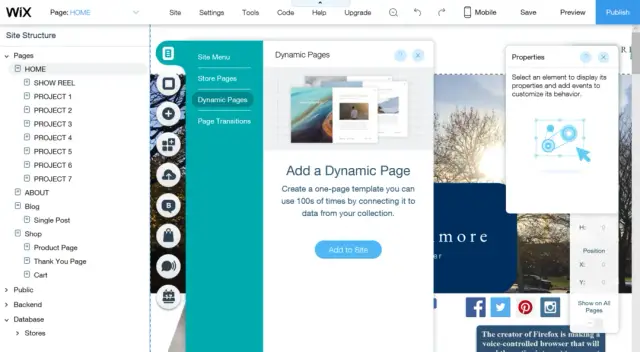Best and Most Popular CMS Platforms in 2024
Discover the best and most popular CMS platforms in 2024, offering key insights into their strengths, features, and pricing to help you choose the perfect fit for your website.

In an age where having a strong online presence is crucial to reach and engage with potential customers, creating and maintaining the perfect website has become imperative for businesses of all sizes. To do this, selecting the right Content Management System (CMS) - a tool that allows you to efficiently create, manage, and publish content - is integral to the process. In this article, we'll delve into the importance of choosing the right CMS for your website, and then highlight the top CMS platforms available in 2024, offering a comprehensive comparison of their features, pricing, strengths, and weaknesses.
The Importance of Choosing the Right CMS
Choosing the right CMS platform is critical for your website's success, as it affects several aspects of your online presence. Here are some key reasons why selecting the appropriate CMS should be a primary consideration:
- Usability: A user-friendly CMS will empower your team to create and manage content efficiently, helping you keep your site updated and relevant.
- Performance: A well-optimized CMS with efficient caching and compression capabilities will improve your site's loading time, which is vital for both user experience and search engine optimization (SEO).
- Customization options: The right CMS should offer your developers flexibility and ease in customizing your site's design and functionality to match your brand and needs.
- Extensibility and integration: As your business grows, you need a CMS that can accommodate expanded content and functionality requirements, whether through plugins, modules, or third-party integrations.
- Security: A secure CMS with powerful features and regular updates will protect your site against attacks, ensuring the safety of your data and your users' trust.
- SEO: The ideal CMS should offer built-in SEO tools and support for relevant plugins or add-ons that help optimize your site for better search rankings and visibility.

Best CMS Platforms in 2024
Different CMS platforms cater to different needs, with varying feature sets, pricing options, and target audiences. Thus, the ideal choice will depend on your website's unique requirements. Here are the top CMS platforms in 2024, in no particular order:
- WordPress: An open-source CMS loved by beginners and professional developers alike for its user-friendliness and extensible ecosystem.
- Drupal: A highly flexible and powerful open-source CMS framework that prioritizes security, making it a popular choice for government websites.
- Joomla!: An open-source platform that sits between WordPress and Drupal in terms of complexity, offering more advanced features and requiring slightly more expertise.
- Wix: A user-friendly, cloud-based website builder with a diverse range of professionally-designed templates and an intuitive drag-and-drop editor.
- Squarespace: A sophisticated website builder with beautiful templates, eCommerce functionality, and excellent customer support, making it perfect for businesses prioritizing aesthetics and ease of use.
- Shopify: A complete eCommerce-focused CMS with everything you need to build, manage, and grow an online store.
These platforms each have their unique strengths and weaknesses, which we will discuss in detail in the following sections. This in-depth analysis will help you determine which CMS platform fits your website's specific needs.
WordPress
WordPress is the most popular CMS platform in the world, powering more than 40% of all websites globally. It started as a simple blogging platform in 2003 but has since evolved into a full-fledged content management system suitable for various types of websites, from personal blogs to large-scale eCommerce stores and corporate websites.
Key Features of WordPress
- Extensive Theme and Plugin Library: WordPress offers a vast range of themes and plugins, both free and premium, to extend and customize your website. With over 50,000 plugins and several thousand themes to choose from, you can easily adapt your site's functionality and design to fit your needs.
- Intuitive Interface: WordPress is known for its user-friendly interface, making it easy for beginners and non-technical users to manage their websites. The platform includes a built-in visual editor for creating and editing content and an organized media library for efficient file management.
- SEO-Friendly: The platform is designed with search engine optimization (SEO) in mind and features built-in SEO tools, such as permalinks and meta tags. Moreover, you can integrate popular plugins like Yoast SEO to further enhance your site's search engine rankings.
- Strong Community: WordPress has a huge global community of users and developers who actively contribute to improving and updating the platform's components. This vibrant community also offers support, resources, and tutorials for those looking to learn more about WordPress and its capabilities.
Pros and Cons of WordPress
Pros:
- Highly flexible and customizable with countless themes and plugins
- Beginner-friendly interface
- Solid SEO features and capabilities
- Active and supportive community
Cons:
- The platform could be resource-intensive for larger websites
- Managing updates and security requires regular attention
- A steeper learning curve for more advanced customizations and developments
Drupal
Drupal is a powerful, open-source CMS offering high flexibility, strong security features, and excellent scalability. It suits more complex and enterprise-level projects like government, educational, and large corporate websites. Drupal's sophisticated content management capabilities make it attractive for organizations with diverse content types and display requirements.
Key Features of Drupal
- Modular Architecture: Drupal uses a module-based system, allowing you to easily extend and customize your website with thousands of available modules. This approach allows creating a unique website tailored to your specific needs.
- Advanced Content Management: Drupal handles complex content structures, custom content types, and taxonomies more effectively than most other CMS platforms. This advanced content management capability makes it suitable for content-heavy and data-driven websites.
- Scalability and Performance: Drupal is designed to handle high-traffic websites and can scale up to accommodate millions of visitors without sacrificing performance.
- Security: One of Drupal's key strengths is its focus on security. The platform is known for its strong security features, including built-in protection against common threats and frequent security updates. Many large organizations and government agencies choose Drupal for its strong security credentials.
Pros and Cons of Drupal
Pros:
- Highly flexible and customizable
- Excellent content management capabilities
- Scalable and high-performance platform
- Strong security features
Cons:
- Higher learning curve for non-technical users compared to other platforms
- Limited options for themes and modules compared to WordPress
- More expensive development and maintenance costs due to the need for developer expertise
Joomla!
Joomla! is another popular open-source CMS platform known for its ease of use, extensive features, and flexibility. It occupies a middle ground between WordPress and Drupal, offering a more extensive feature set than WordPress while being less complex than Drupal. Joomla! is an excellent choice for websites requiring a balance of customization options and user-friendliness, such as small businesses, non-profits, and online publications.
Key Features of Joomla!
- Easy Content Management: Joomla! offers a user-friendly interface for managing content, making it easy for non-technical users to update and maintain their websites. It includes built-in support for custom content types and flexible content organization using categories and tags.
- Extensible with Extensions: Joomla! provides thousands of extensions to extend your website's functionality. This includes free and paid options for various purposes such as eCommerce, SEO, social media, and more.
- Built-in Multilingual Support: Unlike WordPress and Drupal, which require plugins or modules for multilingual functionality, Joomla! comes with built-in multilingual support. This feature allows you to create and manage your website in multiple languages without needing third-party extensions.
- Strong Developer Community: Joomla! has an active global community consisting of developers, designers, and users who contribute to the platform's development, support, and resources.
Pros and Cons of Joomla!
Pros
- Easy-to-use interface for content management
- Extensible with a diverse range of available extensions
- Built-in multilingual support
- Active and supportive community
Cons:
- Fewer themes and extensions compared to WordPress
- Advanced customization may require developer expertise
- Limited scalability compared to Drupal
Wix
Wix is a popular cloud-based website builder and CMS platform that caters to many users, from individuals to small and medium-sized businesses. Recognized for its ease of use and intuitive drag-and-drop interface, Wix enables users with little or no technical expertise to create and launch fully-responsive websites.
Key Features
- Intuitive drag-and-drop website builder with a variety of customizable templates.
- AI-powered design assistant: Wix ADI (Artificial Design Intelligence) creates a personalized website for users based on a series of questions.
- Over 100 apps and integrations available in Wix App Market to extend website functionality.
- eCommerce capabilities with online store management, payment gateways, and support for multiple currencies.
- Advanced SEO tools for optimizing website performance on search engines.
- Marketing tools, including email marketing, live chat, and customer management.
- Free SSL certificates for enhanced security.
- Mobile-optimized websites with editing options for better mobile display.

Image source: PCMag
Pricing
Wix offers a free plan with basic features, but it includes Wix branding and does not allow for a custom domain. For more advanced features and the removal of Wix branding, users can opt for their premium plans, which include:
- Combo ($14/month): Custom domain, 3GB storage, 2GB bandwidth, and removal of Wix ads.
- Unlimited ($18/month): 10GB storage, unlimited bandwidth, and additional apps and features, targeting freelancers and entrepreneurs.
- Pro ($23/month): 20GB storage, various apps, and advanced online branding features for growing businesses.
- VIP ($39/month): 35GB storage, priority support, and all Wix features.
For eCommerce, users will require a separate set of plans that include additional store management and eCommerce tools, ranging from $23 to $49 per month.
Squarespace
Squarespace is known for its visually stunning templates and design-focused approach, making it an appealing choice for artists, designers, and other creative professionals. Users can enjoy easy website building with drag-and-drop functionality and various customization options.
Key Features
- Wide range of professionally designed, customizable templates.
- Drag-and-drop website builder for easy editing and updating.
- Mobile-optimized designs that automatically reformat for optimal display on different devices.
- eCommerce features, such as shopping carts, inventory management, and product options.
- Built-in SEO tools for website performance optimization and search engine visibility.
- Third-party integrations, including Google Analytics, Mailchimp, and social media platforms.
- Access to custom CSS and JavaScript for developers seeking advanced customization.
- SSL certificates included for secure browsing and transactions.
Pricing
Squarespace does not offer a free plan, but they do have a 14-day free trial for users to test the platform. Their pricing structure includes four premium plans:
- Personal ($12/month): Custom domain, unlimited storage, basic website analytics, and 2 contributors.
- Business ($18/month): Enhanced eCommerce features, professional email, and premium integrations.
- Basic Commerce ($26/month): Advanced eCommerce tools, customer accounts, and additional selling channels.
- Advanced Commerce ($40/month): Abandoned cart recovery, subscriptions, advanced shipping options, and complete eCommerce functionality.
Shopify
Shopify is a leading eCommerce-focused CMS platform designed to build, manage, and scale online stores. With a user-friendly interface, powerful eCommerce tools, and built-in marketing features, Shopify appeals to merchants seeking a comprehensive solution for their online shop.
Key Features
- Easy-to-use online store builder with customizable themes and templates.
- Comprehensive eCommerce features, including inventory management, product variations, and multiple payment gateways.
- Support for multiple currencies, taxes, and languages, allowing for global expansion.
- Integration with popular marketplaces, such as Amazon, eBay, and Etsy for multi-channel selling.
- Marketing tools, including built-in SEO, email marketing, and social media integration.
- Integrated blog feature for content creation and promotion.
- Abandoned cart recovery and customer management features.
- 24/7 customer support via phone, email, and live chat.
- Access to the Shopify App Store, featuring numerous integrations and extensions.
Pricing
Shopify offers a 14-day free trial with no credit card required. Their pricing plans include:
- Basic Shopify ($29/month): Ideal for new businesses, includes 2 staff accounts, basic eCommerce features, and a shared SSL certificate.
- Shopify ($79/month): Recommended for growing businesses, offers additional features such as gift cards, professional reports, and a lower transaction rate.
- Advanced Shopify ($299/month): Designed for scaling businesses, with a lower transaction rate, advanced analytics, and priority support.
For large enterprises, Shopify also offers a custom plan called Shopify Plus, which provides tailored solutions and features to meet specific business needs.
Conclusion
Selecting the right CMS platform for your website is a crucial decision that can significantly impact its success, performance, and user experience. With so many excellent CMS platforms available, it's up to your goals, technical expertise, and specific requirements to determine which one is the best fit for your website.
The best CMS platforms in 2024, such as WordPress, Drupal, Joomla!, Wix, Squarespace, and Shopify, offer diverse features, pricing, support, open-source options, and customizability to cater to almost any website creation need. Before committing to a particular CMS platform, take time to research and compare their features, accessibility, ease of use, and user experience. Consider factors such as security, performance, scalability, and the availability of plugins, themes, and extensions.
If you're looking for a more non-traditional approach to website development and management, consider exploring no-code platforms like AppMaster.io, which offers powerful tools and capabilities for building web, mobile, and backend applications with minimal coding knowledge.
Understanding your website objectives, target audience, and technical requirements will guide you in selecting the perfect CMS platform for your online presence. With the right choice and effective content management, your website will have the potential to grow, evolve, and succeed in the ever-changing digital world.
FAQ
A CMS (Content Management System) platform is a software application that enables users to manage and publish digital content on a website in an efficient and organized manner.
Selecting the right CMS platform is crucial for your website's success, as it greatly impacts its performance, usability, content management, search engine optimization, and overall user experience.
Some of the best CMS platforms in 2023 include WordPress, Drupal, Joomla!, Wix, Squarespace, Shopify, Magnolia, Ghost, AppMaster.io, and Silverstripe. Each platform offers a unique set of features, catering to different needs and website types.
Consider factors such as ease of use, features, customization options, scalability, pricing, security, and the availability of plugins, extensions, or third-party integrations when selecting a CMS platform.
Yes, there are several open-source CMS platforms available, like WordPress, Drupal, Joomla!, and Ghost. These platforms offer users greater flexibility and customization options, as well as access to a vast community of developers and resources.
Shopify is considered one of the best eCommerce-focused CMS platforms, with a robust suite of tools for creating, managing, and scaling an online store. However, other platforms like WooCommerce for WordPress and Joomla! with HikaShop integration can also cater to eCommerce needs.
AppMaster.io is a no-code platform primarily focused on creating and managing backend, web, and mobile applications. While it may not be a traditional CMS platform, its ability to generate interactive web applications can serve as an alternative solution for content-driven websites.
Yes, it is possible to switch CMS platforms, but the process can be complex and time-consuming depending on the new platform's compatibility, existing content migration, and website functionality. Proper planning and technical expertise are often required for a seamless transition.





